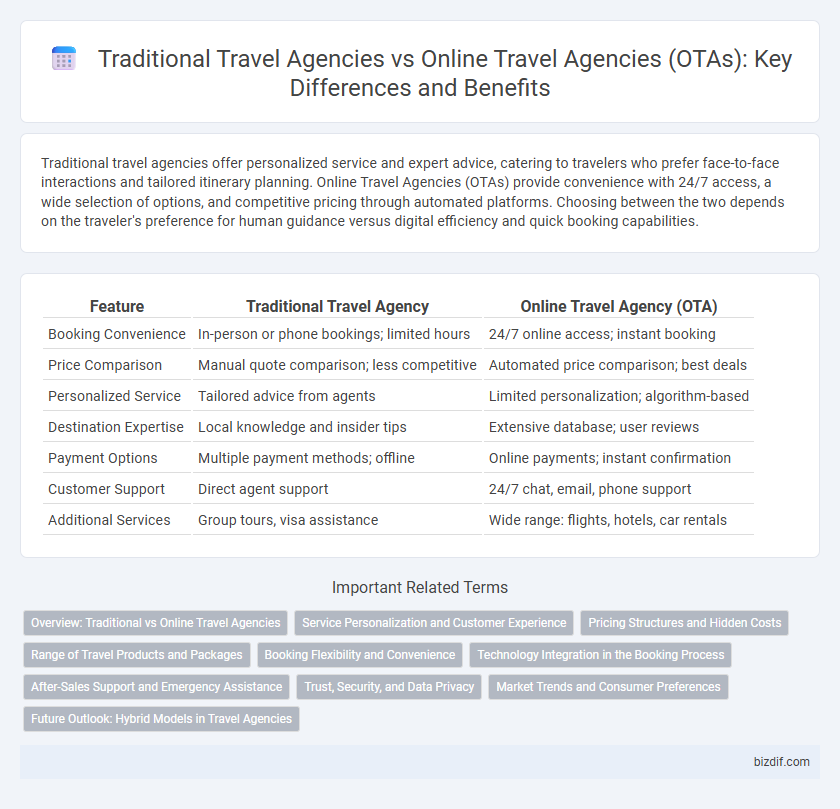Traditional travel agencies offer personalized service and expert advice, catering to travelers who prefer face-to-face interactions and tailored itinerary planning. Online Travel Agencies (OTAs) provide convenience with 24/7 access, a wide selection of options, and competitive pricing through automated platforms. Choosing between the two depends on the traveler's preference for human guidance versus digital efficiency and quick booking capabilities.
Table of Comparison
| Feature | Traditional Travel Agency | Online Travel Agency (OTA) |
|---|---|---|
| Booking Convenience | In-person or phone bookings; limited hours | 24/7 online access; instant booking |
| Price Comparison | Manual quote comparison; less competitive | Automated price comparison; best deals |
| Personalized Service | Tailored advice from agents | Limited personalization; algorithm-based |
| Destination Expertise | Local knowledge and insider tips | Extensive database; user reviews |
| Payment Options | Multiple payment methods; offline | Online payments; instant confirmation |
| Customer Support | Direct agent support | 24/7 chat, email, phone support |
| Additional Services | Group tours, visa assistance | Wide range: flights, hotels, car rentals |
Overview: Traditional vs Online Travel Agencies
Traditional travel agencies offer personalized services with face-to-face interactions, providing tailored travel planning and support, often benefiting travelers seeking customized experiences or complex itineraries. Online Travel Agencies (OTAs) prioritize convenience and accessibility with digital platforms that allow users to compare prices, book flights, hotels, and packages instantly, leveraging extensive databases and real-time updates. While traditional agencies emphasize expert advice and human connection, OTAs lead in efficiency, competitive pricing, and user-friendly interfaces, catering to tech-savvy travelers.
Service Personalization and Customer Experience
Traditional travel agencies offer highly personalized service through direct interaction with agents who tailor travel plans based on individual preferences and detailed client consultations. Online Travel Agencies (OTAs) leverage AI algorithms and extensive user data to provide customizable options and instant booking convenience, enhancing customer experience through seamless, tech-driven interfaces. Both models aim to optimize service personalization, with traditional agencies excelling in bespoke guidance and OTAs delivering scalable, data-driven customization.
Pricing Structures and Hidden Costs
Traditional travel agencies often charge service fees that can increase the overall trip cost, whereas Online Travel Agencies (OTAs) typically offer lower upfront prices but may include hidden costs like booking fees, cancellation charges, or additional taxes. OTAs utilize dynamic pricing algorithms that adjust fares based on demand and availability, potentially leading to fluctuating prices that lack transparency compared to flat fees in traditional agencies. Understanding these pricing structures is crucial for travelers aiming to avoid unexpected expenses while maximizing value from either service type.
Range of Travel Products and Packages
Traditional travel agencies often offer personalized service with curated travel packages, but their range of products can be limited to partnerships with select suppliers. Online Travel Agencies (OTAs) provide extensive options including flights, hotels, car rentals, and dynamic package deals from a vast network of global providers. OTAs leverage technology to aggregate a wide variety of travel products, enabling customers to compare prices and customize itineraries efficiently.
Booking Flexibility and Convenience
Traditional travel agencies offer personalized service with flexible booking options, allowing travelers to tailor their itineraries through direct interaction with agents. Online Travel Agencies (OTAs) provide unmatched convenience by enabling instant bookings and real-time availability across multiple providers, accessible 24/7 from any device. While traditional agencies excel in customized support during complex travel planning, OTAs dominate in quick, user-friendly reservations and broad comparison tools.
Technology Integration in the Booking Process
Traditional travel agencies often rely on manual booking methods and face-to-face interactions, which can limit real-time availability and price comparisons. Online Travel Agencies (OTAs) leverage advanced technology integration, such as automated booking engines, AI-driven personalized recommendations, and instant confirmation systems, enhancing efficiency and user experience. The seamless integration of APIs with airlines, hotels, and car rental services enables OTAs to offer comprehensive, up-to-date travel options that traditional agencies struggle to match.
After-Sales Support and Emergency Assistance
Traditional travel agencies offer personalized after-sales support with dedicated agents providing immediate assistance during emergencies, ensuring tailored solutions and emotional reassurance. Online Travel Agencies (OTAs) rely heavily on automated systems and call centers, which may result in slower response times and less individualized emergency support. The presence of in-person consultation in traditional agencies enhances crisis management, while OTAs prioritize convenience and 24/7 digital access for post-booking services.
Trust, Security, and Data Privacy
Traditional travel agencies often build trust through personalized service and face-to-face interactions, fostering a sense of security for travelers. Online Travel Agencies (OTAs) prioritize robust encryption protocols and stringent data privacy policies to protect customer information in digital transactions. While traditional agencies rely on reputation and direct communication, OTAs leverage technology standards such as GDPR compliance and secure payment gateways to enhance trust and data security.
Market Trends and Consumer Preferences
Traditional travel agencies maintain a loyal customer base through personalized service and expert local knowledge, appealing to travelers seeking tailored experiences and trust. Online Travel Agencies (OTAs) dominate market share by leveraging advanced technology, competitive pricing, and user-friendly platforms, meeting the growing demand for instant booking and convenience. Current market trends indicate a shift toward hybrid models combining human expertise with digital innovation to satisfy diverse consumer preferences and enhance user engagement.
Future Outlook: Hybrid Models in Travel Agencies
Hybrid models combining traditional travel agencies and Online Travel Agencies (OTAs) are shaping the future of travel services by integrating personalized, in-person consultation with seamless digital booking platforms. Advanced technologies such as AI-powered chatbots and virtual reality tours enhance customer experience, while hybrid agencies leverage data analytics to offer tailored travel packages. This convergence allows agencies to cater to diverse customer preferences, driving growth through a balanced approach of human expertise and innovative online convenience.
Traditional agency vs Online Travel Agency (OTA) Infographic

 bizdif.com
bizdif.com